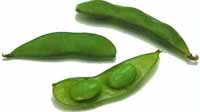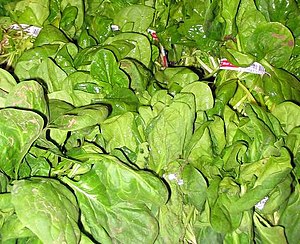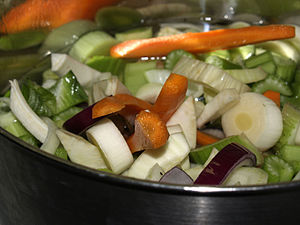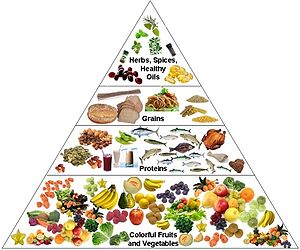We've got a long and thoughtful post for you today. So long, in fact, that I'll divide it up into 2 posts, just in case you have other stuff to do....
This has been a hotly debated topic for many years, and I've read and studied lots of materials, articles, and books on both sides, and was also raised alternately vegetarian and meat-eating, as my parents were very experimental in their diets. Ultimately, I came to the conclusion that we, as humans, are NOT designed for a strictly vegetarian diet. Although obviously, we are not designed for a strictly carnivorous one either....
 Image via Wikipedia
Image via WikipediaI am definitely a proponent of the saying, "everything in moderation," and I also DO believe that most Americans eat way too much meat. I am not at all a big fan of the traditional "food pyramid", which is way too heavy on grains and starches, but I believe in a balanced diet heavy on fruits and vegetables, light-to-moderate on meat and dairy, and light on grains. And NO PROCESSED FOODS, which are evil!
I recently came across an article for vegetarians, detailing the top 5 nutrients that tend to be lacking in a vegetarian diet, and offering some vegetarian solutions for these deficiencies. Upon close examination though, their logic didn't always hold up. Here I will cover the main points from the article, and my objections to each one.
Point One: "Vegetarian diets tend to be richer in antioxidants, certain vitamins, and healthy fats."
My objection: Non-vegetarian diets can also be rich in these things, if you eat a balanced diet! This is like saying drivers who don't wear seat belts tend to be more likely to be thrown from their vehicles. True, but guess what? You can change your statistics if you.... PUT ON YOUR SEAT BELT!
"In the next few paragraphs, I will explain how you can regularly assimilate larger portions of these (lacking) nutrients into your regular diet:
1. Protein. Different types of protein are made up of different permutations of amino acid chains. In order to create a "complete protein" or a protein that can be assimilated into the human body as tissue, you must consume foods that contain complementary chains of amino acids.
Wheat, nuts, and beans are three types of vegan-friendly incomplete proteins; however, wheat is hard to digest and up to 50% of its protein is lost during the process.
Isolated soy protein, which you can get from a number of sources (including soy milk), can be digested efficiently enough to match the animal protein yields."
My objections: Please note that the first paragraph describes the importance of complete proteins, and then second then suggests you consume INCOMPLETE proteins! How is this a solution?
Yes, wheat is very hard to digest, and has also been linked to an increasing variety and number of health problems. Partial solution: consume sprouted wheat products. Sprouted and fermented grains are much more accessible to the human digestive system, and also may provide other health benefits.
 Image via Wikipedi
Image via WikipediAs for soy, I think this is BIG no-no. Processed soy has been recently linked to all kinds of health problems, such as Alzheimers, breast cancer, and other issues. What about the Japanese, who live longer and healthier lives than most Americans, but eat lots of soy? They also eat more unprocessed soy - e.g. edamame or fresh soybeans, AND lots of fermented soy products (e.g. soy sauce, tempeh, etc.) - relatively little tofu and "soy milk." It is likely not the soy itself that is the problem, but the processing methods, which transform the actual bean into something nearly unrecognizable (and not easily processed by the body). Again, most soy products are
highly processed, and what did I say above about processed foods? (That's right - they're evil!)
So what is a good "complete" protein? There are really only TWO complete protein food sources - the first is breast-milk, which hopefully you are not consuming as an adult :-) and the second is eggs. That is WHOLE eggs, as if you only eat the white, your body will not assimilate the entire protein like it will if you consume it together with the yolk - as I like to say, eat it the way God made it! And, these should not be supermarket factory-farmed eggs. The best eggs (and the only ones I do recommend) are those laid by free-range, pasture-raised hens. Organic is preferable, but if you can't find them, the one thing to make sure of is they were fed on pasture ("free range" itself does not necessarily mean the same thing, so be wary of this!). (For more on the best and healthiest eggs, see
our previous post on this topic. )
2. "Iron. Plant sources contain a significant amount of iron, but in nonheme form, which is more sensitive to inhibitors than iron that comes from animal products. You should do two things to increase your blood-iron levels: 1) consume more plant iron; and 2) avoid absorption inhibitors, such as tea, coffee, and fiber."
My objection: Hmmmm....wonder why our bodies are more able to absorb iron from animal products...if we
aren't supposed to eat them?? I'm okay with the first suggestion, but keep in mind that it is VERY difficult for the human body to get all the iron it needs from plant sources, so consider supplementing with beef. :-) (Grass-fed, organic, and locally and humanely raised only, of course!) As for the second suggestion, are they really suggesting that you limit your consumption of FIBER? One of the main benefits of a vegetarian diet is that it tends to contain much more fiber, and this is one of the greatest health advantages that a vegetarian diet offers. Adequate consumption of fiber is linked to lower rates of cancer and other diseases, as well as reduction of certain digestive problems.
I will post the last 3 nutrients and my thoughts on these, later this week, so be sure to check back! And feel free to post your own comments - we welcome debate here! (And check out a few of my favorite books below, on the "real food movement." They will give you an eye-opening pause, and help you understand what foods really are healthy.)
 Image by Siepert77 via Flickr
Image by Siepert77 via Flickr



















